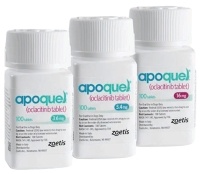Allergies are on the rise in humans, as well as in pets. It seems that here in Arizona we see year-round allergies. Chronic skin changes, pruritis, and recurrent skin infections make atopy a very challenging and frustrating condition to treat, for the veterinarian and for the owner.
Atopy (atopic dermatitis) may occur from reactions to environmental antigens from things such as pollens, molds, and dust mites. This is a common problem in dogs which can easily result in chronic skin disease. This skin disease will likely need to be managed life-long as there is no "cure." It also seems that food allergies have become much more prevalent than they were in the past 10 years. When I was in school over 10 years ago, we were told that allergic dogs would have a food component about 10% of the time. I more recently learned that dogs with atopy or environmental allergies will also often have a food sensitivity, even up to 30-40% of the time.
Management solutions for atopy may include a combination of antihistamines, immune modifiers (such as cyclosporine or Atopica), anti-inflammatories (corticosteroids), medicated shampoos, sprays, hyposensitization injections, supplements (such as coconut oil or essential fatty acids), and other treatments. Because the incidence of a food allergy component is much higher now, a food trial or elimination diet is often part of a treatment plan. Flea control is a crucial part of managing any pruritic dog, as flea allergy dermatitis is the number one cause of allergic dermatitis in pets and even just 1 flea can incite intense pruritis and reaction in sensitive dogs.

The newest treatment on the market to know about is Apoquel (oclacitinib) manufactured by Zoetis . It was available in 2014 but there was such a shortage that most veterinary hospitals only recently began having reliable access to it. It magically appeared on our shelf a few months ago, but I didn't know anything about it. It seemed to have good results within the veterinary community. A couple of our chronic dermatitis patients were doing well on it. I wanted to know what it was and how it worked, and what were any long term side effects? It seemed like it might be a good treatment option for our chronic allergy cases. Here is what I found out:
- Apoquel is a JAK (Janus kinase) inhibitor which targets the inflammation pathway. Cytokines play a role in cell growth and immune function. The cytokines work by binding to certain cytokine receptors. These receptors rely on JAK enzymes for proper signaling. A JAK inhibitor blocks this pathway, preventing this signal and thereby preventing inflammation.
- This is an immune-modifying drug. (A similar human medication on the market is tofacitinib or Xeljanz, used in treating psoriasis, rheumatoid arthritis, and other autoimmune conditions.)
- In clinical trials, the most common side effects in dogs were vomiting and diarrhea.
- Treatment success for pruritus occurred in a significantly greater percentage of the dogs treated with APOQUEL (66 percent) vs. (4 percent) of dogs treated with placebo (p<0.0001).*
- It is not recommended to use in dogs less than a year of age, or in dogs with severe infections. Concurrent infections should be treated prior to starting Apoquel.
- As with other immune modifying medication (such as Atopica), I would not use this drug in pets with a history of mast cell tumors or lymphoma.
- It may increase the chances of developing serious infections, and may cause existing parasitic skin infections or pre-existing cancers to get worse.**
Just as each pet presents its own unique challenges in proper diagnosis, the same goes for treatment. Each dog will react and respond differently to these various treatments as discussed above. The importance of properly diagnosing the pet and finding the right combination of treatments that will synergistically help the pet is the key to long-term management of chronic skin disease. So far, it seems to be helping many of our chronically itchy patients!

